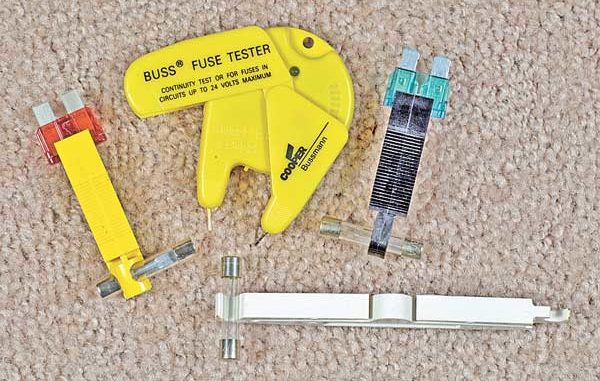
A bass fisherman recently posted a plea for help on a marine electronics forum I frequent. The GPS part of his fish-finder/GPS combo unit suddenly stopped tracking his position and displayed the warning, “GPS Not Responding.”
Two repair shops had already told him his problem was probably a bad GPS antenna, and he was hoping for a better second opinion. Following advice from other forum members, he spent an afternoon tracking down the GPS antenna’s power source and discovered an inline fuse holder with a dead fuse in it. The fix was lots quicker and cheaper than replacing the GPS antenna module.
He’d bought the boat used, and such problems are commonplace on used rigs, because when electronics are upgraded, wiring problems are fixed or other electrical work is done, everyone seems to do things differently. In this case, the new owner could work on the boat at home in the garage, take all the time he needed, and even drive to the closest marine dealer to get the right fuse.
When your bilge pump quits and you find yourself ankle deep in water on a dark and stormy night, it can be a different story.
Can you locate the circuit breakers or fuses for the bilge pump, running lights and VHF radio (if you have one) on your boat? How about for your engine’s ignition? Did you know that many outboard engines have these fuses under their cowling, and some have more than one? If your boat has circuit breakers, do you know if they reset automatically or need to be manually reset?
If you have fuses instead of breakers, do you know where they are? Do you have spares onboard? Will you need any tools to change them? How about a flashlight for working in the dark? You’d be amazed how many owners of both new and used boats don’t have positive answers for these questions.
Most boats have a fuse or breaker panel mounted near the helm that protects the circuits for factory-installed equipment. But all bets are off in the case of accessories added by a previous owner, especially if all the connections on the factory fuse panel were already occupied. You may find that no fuse was installed in a power cable or that an inline fuse holder was installed somewhere in the positive-power wire between the battery and the accessory (hopefully where it can be found easily).
Make sure you know how to reset the breakers or have replacement fuses once you locate them. It is also a good idea to make sure that the fuses in place have the proper ratings for the accessories they protect. Fuses that are too small can blow when they shouldn’t, and fuses with too high a rating don’t blow when they should and can cause damage, even fires in extreme cases.
If the fuses or breakers in your panel are not labeled, it’s a good idea to draw a diagram labeling them, then laminate it and put it in the first compartment you would expect to look in during an emergency.
Strong retention springs aided by mild corrosion can make fuses difficult to remove from their holders with just your fingers. Neat little non-conductive tools can make removing both the glass tube and flat, double-bladed types easy. Some fuse panels may have covers that require a screwdriver to open.
Unsealed plastic inline fuse holders for tubular glass fuses are the least reliable type, and I replace them at the first sign of trouble. I prefer sealed holders that use flat-bladed fuses. Always wire inline holders as close as possible to the battery or power bus supplying power to the accessory; that way it protects as much of the wiring as possible.
The time to find these circuit protectors and stock up on the necessary tools and replacement fuses is before you need them. Don’t wait for an emergency; heck, don’t even wait until it’s an inconvenience. Just do it, and if you don’t feel qualified to do it all yourself, seek the help of a competent marine mechanic with good references. That in itself probably merits an entire column.
The bad professional troubleshooting experienced by the fisherman on the internet forum reminded me of a stand-out “Dear Abby” column. Someone wrote in after being diagnosed with a horrible disease and asked if he should seek a second opinion. She said yes, definitely, because 50 percent of all doctors graduated in the bottom half of their class.
Stay safe and have fun on the water.


